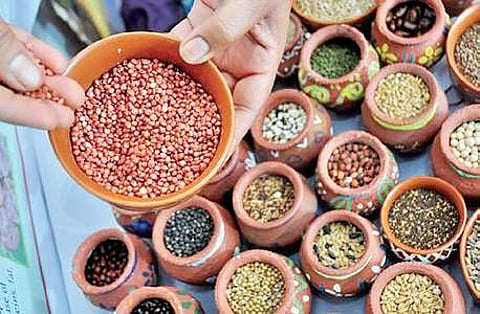

HYDERABAD: At a time when drought-resistant indigenous millets of Telangana beg for more attention not just as a nutritional food supplement and staple diet, the city-based Indian Institute of Millet Research (IIMR) has opened up an entire market for dryland farmers and entrepreneurs.
The institute has recently been sanctioned a grant of `10 crore to establish a technology-business incubator, the first of its kind in the country, by the department of science and technology of the Union government. The budgetary allocation will begin this April. Named NIELAN (Nurturing Incubation Entrepreneurship with Leverage of Agri-innovation in Nutri-cereals), the facility set up on the IIMR campus at Rajendranagar will accommodate about 10 entrepreneurs.
IIMR director Vilas A Tonapi said, supply of millets does not match the huge demand for the cereal. “We have all the technologies and the market for value addition products. On the policy front too, we would love to work with the state government. Otherwise, all the R&D means nothing,” he said. The incubatees will have close to 70 technologies (including ready-to-consume products, shelf-life technologies, bio-fortification to enhance functionality of food, machinery, packaging and labelling) generated at the institute to choose from, apart from an entire value chain of production to consumption. The necessary infrastructure such as office space, factory and storage facility will also be provided on the campus for the same period, explained B.Dayakar Rao, principal scientist who will head the incubator.
Rao said that the researchers and scientists will offer mentoring on physical as well as financial aspects. .
“We are bringing together millet farmers from all over the country to form a consortium, link them with self-help groups and NGOs and form FPOs (farmer producer organisations) which would be like a vibrant commercial face of cooperatives,” said Rao. “At the moment, the farmer does not benefit much. To make the system sustainable, we need to do backward integration. With FPOs and production clusters, farmers would start benefiting immensely. The erstwhile districts of Rangareddy, Medak, Mahbubnagar, Nalgonda and Adilabad have the potential to become supply hubs,” he said.
Millets are grown in Jharkhand, Uttarakhand, Madhya Pradesh, Karnataka apart from Telangana. In the state, yellow jowar in Mahbubnagar is the most widely cultivated millet.